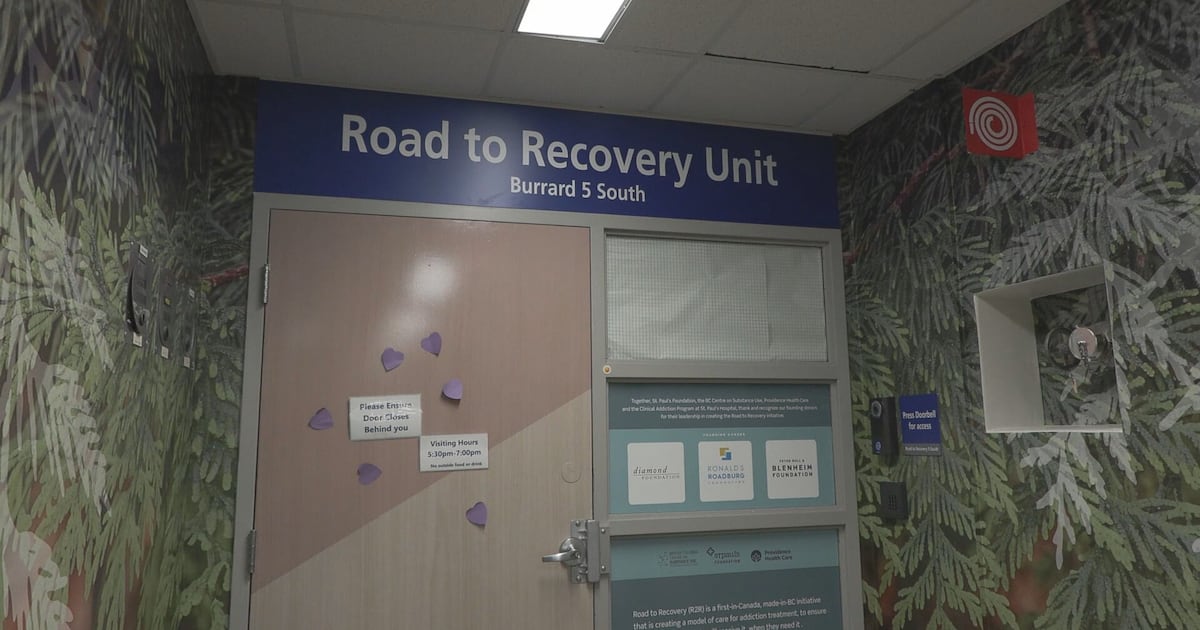Health
Detox Wait Times Fall as B.C. Launches Innovative Treatment System

Vancouver Coastal Health has significantly reduced wait times for detox beds following the implementation of the Road to Recovery (R2R) program at St. Paul’s Hospital. This innovative initiative allows individuals seeking help for drug and alcohol addiction to access a broad range of treatment options through a single phone number. The success of the R2R program, which began two years ago, has prompted plans to extend this model across the province.
Streamlining Access to Treatment
The previous approach to addiction treatment in British Columbia was often seen as fragmented, making it challenging for patients and their families to navigate available services. According to Dr. Shona Nolan, co-founder of the R2R program and an addiction physician, the introduction of a centralized contact point has made a significant difference. “Through the creation of a single front door, it streamlines people to one single telephone number to call to access substance use services,” she explained.
When individuals call this number, they are triaged by a nurse or doctor who evaluates their needs and directs them to the next available detox bed within the health authority. Those experiencing severe withdrawal symptoms, which can include hallucinations or complications requiring intensive care, are prioritized for treatment at St. Paul’s Hospital.
The average wait time for recovery beds has decreased from months to weeks, with some patients now able to begin detox on the same day they seek help. This change has led to frustration among healthcare providers regarding political statements that claim treatment is unavailable. “It’s harmful to patients when they hear bits of information that is inaccurate or false and deters them from accessing services that may otherwise meet their needs,” Dr. Nolan stated.
Personal Stories of Recovery
The impact of this streamlined system is highlighted in the experience of Jamie Ramsey, a 25-year-old who struggled with alcohol addiction. After a series of intense binge-drinking episodes, she sought emergency care due to severe withdrawal symptoms. “I definitely felt super overwhelmed, super embarrassed that I was there for something like that,” she recalled.
After being advised by paramedics to visit the Rapid Access Addiction Care Clinic for the R2R intake, Ramsey found the process to be manageable. She appreciated that she only needed to explain her situation once to various healthcare providers. “All I had to do was show up and say, ‘I need help,’ and everything else that I needed to be done was guided for me,” she shared. Following her intake, she entered detox the next day and is now thriving in her recovery journey.
While the government continues to expand the number of detox and treatment beds available for individuals struggling with substance use, challenges remain. The NDP government faces criticism each time incidents of public disorder occur, highlighting the ongoing struggle to address addiction in the province.
Understanding the Complexities of Treatment
Experts emphasize that addiction treatment is not a straightforward process. “One thing that people don’t understand about addiction treatment is how incomplete our knowledge is of how to cure people,” said Dr. Mark Lysyshyn, deputy chief medical health officer for Vancouver Coastal Health. “Even our best, most evidence-based treatment for addiction doesn’t work for half of people.”
While privately run detox facilities and treatment centers offer various alternative approaches, the lack of regulation raises questions about their effectiveness. Some programs charge exorbitant fees, prompting calls for oversight in the industry.
Notably, participation in the R2R program is entirely voluntary. “This is a purely voluntary system of care,” Dr. Nolan explained. “We recognize that experiencing withdrawal for many different reasons can be an intense emotional, physical, spiritual journey.”
This article is part of a series examining British Columbia’s response to addiction and the broader issues surrounding substance use in the province.
-

 Politics4 weeks ago
Politics4 weeks agoSecwepemc First Nation Seeks Aboriginal Title Over Kamloops Area
-

 World5 months ago
World5 months agoScientists Unearth Ancient Antarctic Ice to Unlock Climate Secrets
-

 Entertainment5 months ago
Entertainment5 months agoTrump and McCormick to Announce $70 Billion Energy Investments
-

 Science5 months ago
Science5 months agoFour Astronauts Return to Earth After International Space Station Mission
-

 Lifestyle5 months ago
Lifestyle5 months agoTransLink Launches Food Truck Program to Boost Revenue in Vancouver
-

 Technology3 months ago
Technology3 months agoApple Notes Enhances Functionality with Markdown Support in macOS 26
-

 Lifestyle3 months ago
Lifestyle3 months agoManitoba’s Burger Champion Shines Again Amid Dining Innovations
-

 Top Stories2 months ago
Top Stories2 months agoUrgent Update: Fatal Crash on Highway 99 Claims Life of Pitt Meadows Man
-

 Politics4 months ago
Politics4 months agoUkrainian Tennis Star Elina Svitolina Faces Death Threats Online
-

 Sports5 months ago
Sports5 months agoSearch Underway for Missing Hunter Amid Hokkaido Bear Emergency
-

 Politics5 months ago
Politics5 months agoCarney Engages First Nations Leaders at Development Law Summit
-

 Technology5 months ago
Technology5 months agoFrosthaven Launches Early Access on July 31, 2025



















